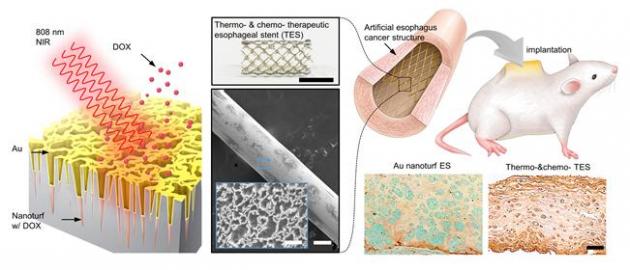Korea Institute of Science and Technology (KIST) said its researchers have developed a new stent that minimizes the restenosis of cancer cells while showing a synergetic effect with conventional chemotherapy such as radiation therapy.
Patients with esophageal cancer undergo stenting to deliver food properly. However, such a process may cause restenosis in the cancer tissue.
The team, led by Professors Jung Young-mee at KIST and Lee Ji-yeon at Sungkyunkwan University, developed a stent made out of nitinol, a non-magnetic alloy of nickel and titanium. The new stent can effectively form the nanostructure on its surface, which in turn can control the release rate of the drug and treat cancer.

The research team also used the stent to form tens or hundreds of small nano-pores by using biocompatible polymers allowing the anticancer drug to receive support uniformly.
Regarding drug loading, the team covered it with a thin gold film, which can absorb the infrared rays from the catheter and kill the cancer cell with heat enabling thermotherapy.
The team has also confirmed through study that the heat allows the drug to release its components more slowly, while the nanostructure minimizes restenosis and inhibit recurrences.
“The team has successfully developed an esophageal stent with various functions such as drug loading, drug release control, heat therapy, and prevention of esophageal cancer cell restenosis,” Professor Lee said.
ACS Nano published the results of the research.

